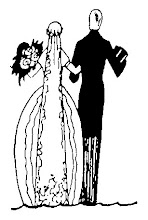
I have read The Brothers Karamazov by Dostoevsky, but have never read Crime and Punishment. I am already into it by about 40 pages, and have been very moved. I may even like it better than I did The Brothers Karamazov. Below is a Breakpoint (Chuck Colson) commentary on it. Christian author Ken Boa does a marvelous series on the Great Books which you can get on CD from his website. When I taught the Great Books I used his cd's as a resource. They are well done. Anybody want to read Crime and Punishment with me? Let me know. This month he is reading Anna Karenina by Tolstoy which is one of my all time favorite novels. That would be a good one to put on the classic list for us to read together.
Dostoevsky had lived in Western Europe, and as a Christian, he saw the dangers of its fashionable intellectual ideas like nihilism and utilitarianism. A “pattern in his work,” Boa says, is the conflict of Christianity with utopian worldviews. Dostoevsky wanted to make it clear that “ideas have consequences.”
In Crime and Punishment, Raskolnikov’s nihilism and utilitarianism lead to his murder of two women. “Under the spell of an idea,” he decided that a miserly old pawnbroker does not deserve to live—and then he kills her sister when she discovers the crime.
Paradoxically, these evil acts become the turning point for Raskalnikov. This “rational and proud” young man, spurred by guilt, begins to move toward “humility” and “openness” to other people. He comes to realize that the moral law that he disdained is written on every human heart, and that he is just as bound by that law as every other human being.
Guided by a young woman named Sonia, who has been forced into prostitution to feed her starving family, Raskolnikov learns that suffering, not rebellion, leads to redemption.
Finally turning himself in, he is sentenced to eight years in a Siberian prison. Still, his repentance is not yet fully genuine. He is still the man who was willing to “sacrifice his existence for an idea.” Only when he realizes that he loves Sonia—that he finally has developed the ability to care for another human being besides himself—is he ready to experience full redemption. The epilogue ends as he begins to read the New Testament that she has given him.
Boa notes that some critics have called this a “weak happy ending,” not understanding that “in . . . the very structure of the novel, we see that the gospel is central within the novel’s plot.” Sonia has acted as a “Christ figure” all along, helping to liberate Raskalnikov from the Nietzschean “will to power” that had enslaved him.
As you can see, Crime and Punishment offers some very sobering and valuable food for thought for us today. As Ken Boa points out, this book helps to show us that we’re still surrounded by the bankrupt worldviews that have descended directly from the utopian ideals of Dostoevsky’s time—and that the way out is not through focus on our self (as our culture teaches us today,) but only through surrender to Christ.
2 years ago


0 comments:
Post a Comment